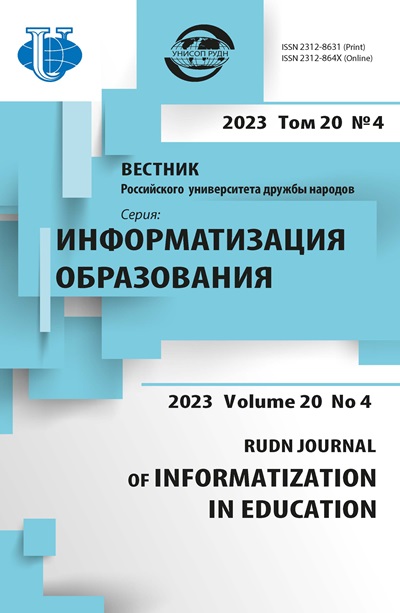Issue
Title
Authors
|
Shunina L.A., Grinshkun A.V. |
|
Vaganova V.I., Kuchumova O.P. |
|
Komelina E.V. |
|
Zenkina S.V., Pankratova O.P. |
|
Zenkina S.V., Gerasimova E.K., Fedoseeva M.V. |
|
Aslanov R.E., Bolshakov A.A., Grinshkun A.V. |
|
Nikulina E.G., Starkova E.K., Ryabchikova V.G., Sergeeva N.A. |
|
Gribkov D.N., Dengina M.R., Matveev V.V., Masharova T.V. |
|
Aslanov R.E., Shunina L.A., Grinshkun A.V., Bolshakov A.A. |
|
Lotova E.Y. |
|
Semenova D.A. |
|
Zotova A.S. |
|
Rizakhojayeva G.A., Akeshova M.M. |
|
Shamkut V.L. |
|
Kerimbaeva B.T., Niyazova G.Z., Kaya K. |
|
Pudova S.S. |
|
Yuzhakov A.A. |
|
Sadykova A.R., Levchenko I.V., Kartashova L.I. |
|
Usmanov S.A. |
|
Beloglazov A.A., Beloglazova L.B. |
|
Bocharov M.I. |
|
Kartashova L.I., Levchenko I.V. |
|
Bostanov R.A., Gerbekov H.A., Halkecheva I.T. |
|
Rudakova D.T. |
|
Provotorova E.A. |
|
Levchenko I.V., Sadykova A.R. |
|
Beloglazov A.A., Beloglazova L.B., Beloglazova I.A., Trubacheev E.V., Maltsev O.L., Kletskin A.A., Pechersky D.K., Blokhin M.R. |
|
Osipovskaya E.A. |
|
Fakova M.O. |
|
Fedotov A.V., Polushkina E.A. |
|
Zhdanov A.A. |
|
Andreev A.V., Usova N.A. |
|
Beloglazov A.A., Beloglazova L.B., Beloglazova I.A. |
|
Grigorieva K.S., Yakhina R.R. |
|
Bubnov V.A., Sadykova A.R. |
|
Vlasov D.A., Sinchukov A.V. |
|
Lukin D.V., Lukin V.V. |
|
Detusheva L.V., Dobritsa V.P. |
|
Polushkina A.O. |
|
Vlasov D.A., Sinchukov A.V., Kachalova G.A. |
|
Berkimbaev K.M., Akeshova M.M. |
|
Beloglazova L.B., Bondareva O.V. |
|
Rudenko A.E. |
|
Rybakov D.S. |
|
Ivanova T.V. |
|
Aldiyarov K.T., Bidaybekov E.Y. |
|
Aldiyarov K.T. |
|
Khozhaeva T.S. |
|
Glizburg V.I. |
|
Proshina E.U. |
|
Dmitriev N.N., Revinova S.Y., Shevtsova N.A. |
|
Meyrbekova G.P., Daniyarov T.A., Daribayev Z.E., Berkimbayev K.M. |
|
Aldiyarov K.T., Bidaybekov E.Y. |
|
Mal G.S., Grinshkun G.G. |
|
Kornilov V.S. |
|
Grinshkun V.V., Shunina L.A. |
|
Kornilov V.S., Lvova O.V., Obolensky I.S. |
|
Yaroshevich V.I., Safuanova A.M., Safuanov I.S. |
|
Isaeva P.M. |
|
Zaslavsky A.A. |
|
Kornilov V.S. |
|
Bidaybekov E.Y., Kornilov V.S., Kamalova G.B., Akimzhan N.S. |
|
Polushkina A.O., Krasnova G.A. |
|
Dobritsa V.P., Ivanova T.V. |
|
Prozorova G.V. |
|
Vasilenko A.V. |
|
Denisova A.B. |
|
Lagashina N.I. |
|
Isachenko O.V. |
|
Kudinov V.A., Grigoriev S.G. |
|
Makulbek A.B., Ernazarova D.Z. |
|
Kostikov A.N., Kuznetsova I.V. |
|
Kapranov V.K., Kapranova M.N. |
|
Kvashnin P.I., Rusinov A.S. |
|
Lomasko P.S. |
|
Zhuravleva E.V. |
|
Kornilov V.S., Tsyganov V.I. |
|
Nyshanova S.T. |
|
Grigoreva K.S. |
|
Polushkina A.O. |
|
Krasnova G.A., Polushkina A.O. |
|
Sadykova A.R., Levchenko I.V. |
|
Kusakina E.V., Samarina E.A., Frolov Y.V. |
|
Beloglazov A.A., Beloglazova L.B. |
|
Tsarapkina J.M. |
|
Gerbekov H.A., Baychorova S.K., Laypanova M.S. |
|
Yatsenko A.I. |
|
Gerbekov H.A., Kubekova B.S., Chankayeva N.M. |
|
Senashenko D.V., Yurkov A.V. |
|
Beloglazova L.B., Beloglazov A.A. |
|
Detushev I.V., Dobritsa V.P. |
|
Bychko V.E. |
|
Kornilov V.S., Berkimbayev K.M., Ernazarova D.Z. |
|
Bogun V.V. |
|
Gracheva A.P. |
|
Bazhenovа S.A. |
|
Usembaeva I.B., Kornilov V.S., Berkimbaev K.M., Sarybaeva A.H. |
|
Grigoriev S.G., Grinshkun V.V., Levchenko I.V., Zaslavsky O.Y. |
|
Artyukhina M.S. |
|
Zaslavskaya O.Y. |












